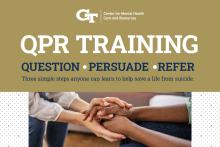Office of Graduate Education Signature Events
GradExpo
GradExpo is Georgia Tech's resource fair for new graduate students. Held in conjunction with Graduate Institute Orientation (GradIO), GradExpo gives students the opportunity to engage with various campus units and student organizations and to learn about the resources and services they provide.
Graduate Student Welcome and Fall Picnic
New and returning graduate students are welcome to this annual in-person event as we share Georgia Tech's traditions, academic standards, and provide students with spirit items.
Virtual Graduate School Showcase Hosted by Georgia Tech
Those interested in graduate education can attend this virtual event to meet with both Georgia Tech program recruiters and recruiters from universities around the U.S. and abroad. This event is hosted by Georgia Tech's Pre-Graduate and Pre-Professional Advising, the Office of Graduate Education, and the Career Center.
Graduate Education Summit
The 2025 Graduate Education Summit focuses on actionable strategies that elevate the graduate student experience and advance academic and research success. This year's theme is Championing Graduate Student Success: Building Holistic Support Systems for Research, Career Development, and Well-Being. The Summit is hosted by the Office of Graduate and Postdoctoral Education in partnership with CTL, the College of Lifetime Learning, the Graduate Student Government Association, and Student Engagement and Well-Being.
Career, Research, and Innovation Development Conference (CRIDC)
CRIDC is an annual professional development event that offers a poster competition, panel sessions led by industry leaders, and career networking opportunities. It is sponsored by the Graduate Student Government Association and the Office of Graduate Education.
Taxes 101
Representatives from Global Human Resources, the Bursar's Office, and the Office of Graduate Education team up to help walk you through the dos and don’ts of filing your taxes.
Three Minute Thesis
The Three Minute Thesis (3MT®) competition challenges students to effectively explain their research in three minutes, in a language appropriate to a non-specialist audience. It is held every year during Graduate Student Appreciation Week.
Graduate Student Appreciation Week
Grad Student Appreciation Week (GSAW) is celebrated the first week of April each year. Daily events throughout the week will provide opportunities to engage, network, and have some fun!
Upcoming Events
The following is a list of various Georgia Tech events open to graduate students. A full listing of all Institute events can be found on the Campus Calendar website. To view Thesis & Dissertation proposal defenses, see MS and Ph.D. Defenses.

